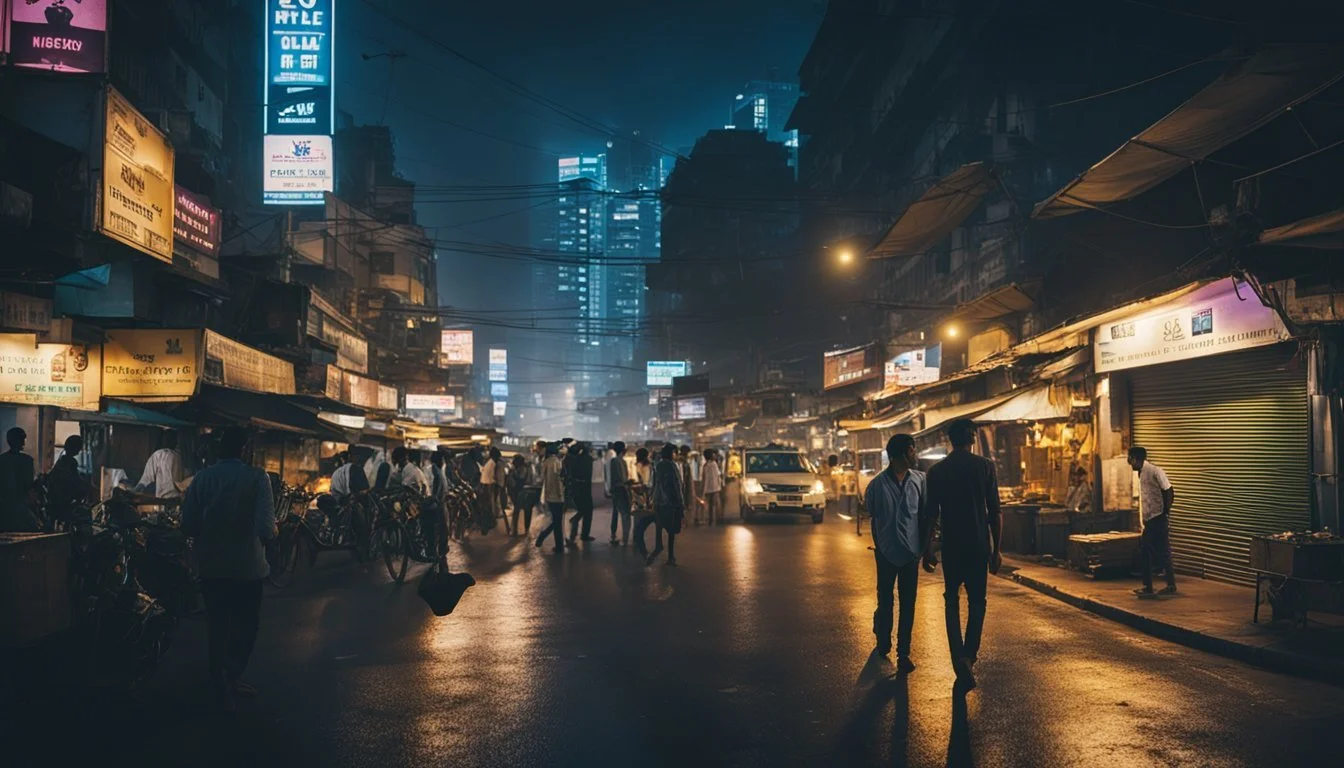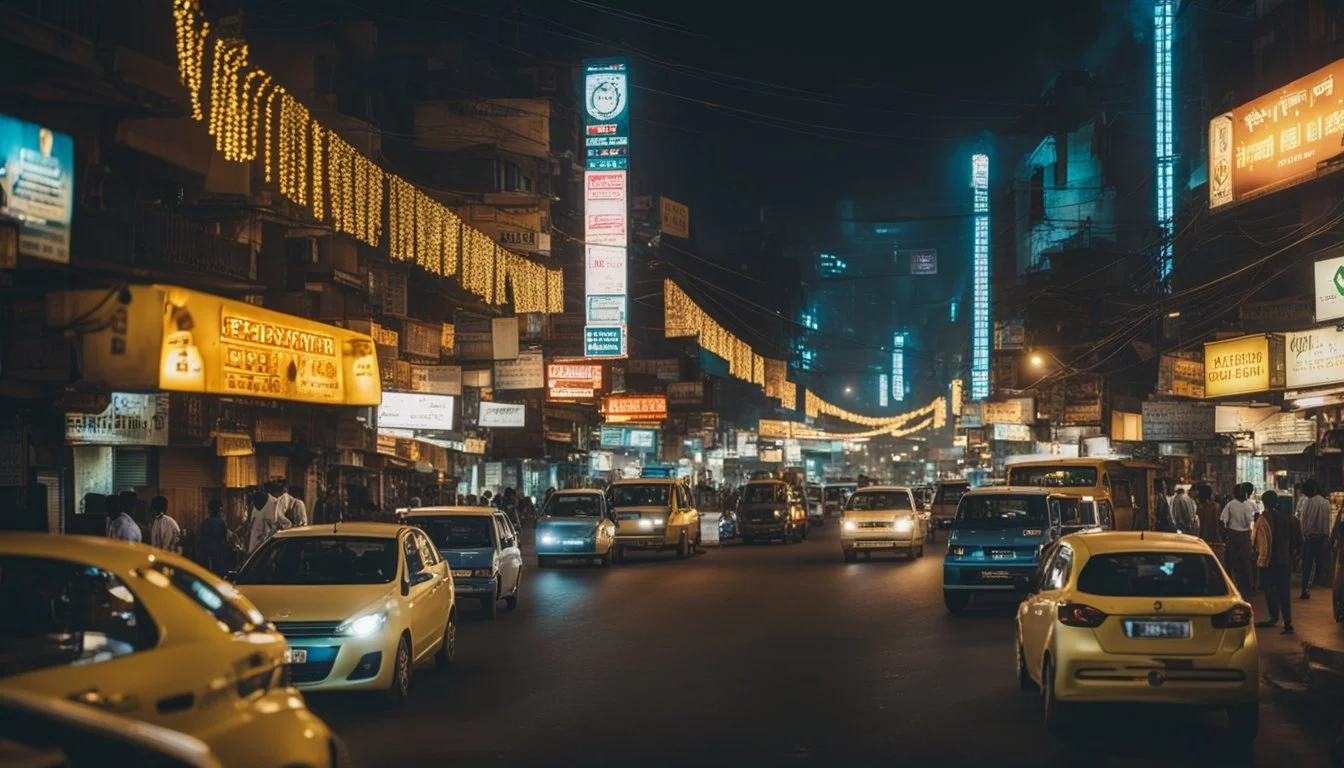6 Captivating True Crime Documentaries Based in Mumbai
Must-Watch Stories
Mumbai, a city with an enigmatic blend of glamour and grit, serves as a gripping backdrop for numerous true crime documentaries. Known for its bustling streets and vibrant culture, Mumbai is also home to some of the most astounding and complex crime stories that have grabbed public attention.
These documentaries delve into the dark underbelly of the city, unearthing tales of crime, corruption, and resilience. Through expert storytelling and meticulous investigation, they reveal the raw truth behind Mumbai's most infamous criminal cases.
1) Mumbai Mafia: Police vs The Underworld (2023)
Mumbai Mafia: Police vs The Underworld is a compelling documentary directed by Raaghav Dar and Francis Longhurst. The film, released in 2023 and produced by Minnow Films, explores the intense and often violent clashes between Mumbai's police force and powerful mafia leaders in the 1990s.
The documentary highlights the rise of 'encounter cops,' law enforcement officers who took extreme measures by killing their targets without legal trials. This resulted in a controversial but effective crackdown on the crime bosses who once held unchecked power in Mumbai.
Key figures depicted in the film include notorious mafia don Dawood Ibrahim and his associates, such as Abu Salem. Through interviews and archival footage, the documentary provides a deep dive into the strategies and politics involved in the fight against organized crime in Mumbai.
Available for streaming on Netflix, viewers can watch this hard-hitting narrative in both Hindi and English languages. The film not only covers the brutal tactics used by both sides but also delves into the moral ambiguities and personal sacrifices involved.
More details can be found on the IMDb page or Wikipedia page.
2) Operation Solitaire (2021)
"Operation Solitaire" dives into one of Mumbai's most complex crime cases, involving a high-stakes diamond heist. The documentary provides a detailed account of the clever orchestration of the crime, highlighting the meticulous planning and execution.
Viewers are introduced to the main perpetrators, their backgrounds, and the elaborate network supporting the heist. This allows for a comprehensive understanding of the criminal operation.
The impact on Mumbai's local businesses, particularly those in the jewelry industry, is explored. Victim accounts and expert analyses shed light on the steps taken by law enforcement to crack the case.
This docuseries paints a vivid picture of not only the crime but also the city's response to high-profile incidents. It underscores the resilience of the Mumbai Police and the community in the face of sophisticated criminal activities.
For more information on "Operation Solitaire," visit its IMDb page.
3) The Sheena Bora Murder Case
The Sheena Bora murder case forms the basis for the Netflix documentary series "The Indrani Mukerjea Story: Buried Truth" (2024). This case revolves around the disappearance and suspected murder of Sheena Bora in 2012, which captivated audiences across India.
Sheena Bora, a young woman, vanished in April 2012. Initially, her absence went largely unnoticed due to misinformation spread by her mother, Indrani Mukerjea. Indrani, a former media executive, claimed Sheena had moved to the United States.
The truth emerged in 2015 when Indrani's driver revealed details about Sheena's death during a police investigation. Indrani, along with her then-husband Peter Mukerjea and ex-husband Sanjeev Khanna, was implicated in Sheena's murder. The revelations shocked the nation and led to intense media scrutiny.
The series delves into the complexities of the case, exploring the motivations and relationships within Indrani Mukerjea's family. The documentary portrays how familial bonds can turn sinister, offering viewers a detailed look at the legal proceedings and media frenzy surrounding the case.
The intense public interest in the Sheena Bora murder case highlights the deep-seated intrigue and mystery that true crime stories can evoke. It’s a compelling part of Mumbai's crime history, showcasing how truth can often be stranger than fiction.
For more in-depth information, check the Netflix page or IMDb.
4) The Corpse Collector (Year Unknown)
"The Corpse Collector" delves into the chilling story of Dorothea Puente, known as the Boarding House Killer. Although not Mumbai-based, this documentary offers insight into the dark world of serial killers and their psychological underpinnings. Dorothea Puente ran a boarding house in Sacramento, California, where she murdered her tenants.
The documentary provides detailed accounts of how Puente lured vulnerable individuals into her home. It explores her manipulative tactics and her ability to evade suspicion for years. Despite the geographical difference, the themes of manipulation, betrayal, and murder resonate universally.
The intense narrative keeps viewers gripped, combining first-hand accounts, media coverage, and expert opinions. This approach creates a compelling storyline that not only informs but also horrifies.
External Link: The Corpse Collector on IMDB
5) The Matunga Murders (2023)
The Matunga Murders documentary, released in 2023, intricately examines a series of gruesome homicides that shook the suburban area of Matunga in Mumbai. The film delves into the investigation led by the Mumbai Police, highlighting the meticulous forensic work and the relentless pursuit of justice.
Set against the backdrop of a bustling city, the documentary captures the emotional toll on the victims' families as they navigate the judicial process. Expert interviews and firsthand accounts add depth to the narrative, providing viewers with a comprehensive understanding of the case.
The filmmakers skillfully balance the procedural aspects of the investigation with the personal stories of those affected. They reveal the complexities and challenges faced by law enforcement in solving such heinous crimes.
For more information on the documentary, visit IMDb.
6) Unholy Alliances
"Unholy Alliances" (2023) investigates the complex relationship between law enforcement and the organized crime syndicates in Mumbai.
The documentary spotlights how both sides often find themselves entangled in a web of mutual dependencies. Police officers, in their struggle to maintain control, sometimes blur ethical lines, forming covert partnerships with notorious criminals.
Insightful interviews with former police officers provide a rare glimpse into these clandestine relationships. They reveal how certain alliances, while purportedly aimed at maintaining order, often led to more chaos and corruption.
By focusing on specific case studies, the documentary sheds light on the inherent challenges of navigating such murky waters. It highlights instances where these collaborations went awry, leading to tragic outcomes.
"Unholy Alliances" critically examines the moral complexities faced by those on both sides of the law. The accounts from journalists and crime experts add depth, offering multiple perspectives on the thin line between upholding justice and facilitating lawlessness.
For more information, visit Unholy Alliances on IMDb.
History of True Crime in Mumbai
True crime in Mumbai has evolved significantly over the decades, marked by high-profile criminal figures and incidents that have shaped public perception and law enforcement tactics.
Notable Criminal Cases
Mumbai's history of crime includes several notorious cases. One of the most infamous figures is Dawood Ibrahim, a gangster who rose to prominence in the 1980s and 1990s. Ibrahim's operations included organized crime, smuggling, and involvement in the 1993 Bombay bombings. His criminal empire extended beyond India, influencing international crime networks.
Another significant case is the 1991 JJ Hospital shootout, where members of the Arun Gawli gang attacked rival gangsters within the hospital premises. This brazen act highlighted the extent of gang wars in Mumbai. The Sheena Bora murder case also drew national attention. In 2015, the media uncovered the complex family dynamics and intrigue behind the murder, involving high-profile individuals from Mumbai's elite circles.
Impact on Society
The persistent presence of organized crime and high-profile cases in Mumbai has had profound social impacts. Crime films and media coverage emphasize the city's criminal culture, influencing public perception. Bollywood often draws inspiration from real-life gangsters, blurring lines between reality and fiction and impacting collective memory.
Law enforcement and public policy have continually adapted. The emergence of "encounter specialists" in the police force during the 1990s aimed to curb gang-related activities. These officers were involved in numerous shootouts, controversial but effective in reducing gang influence.
Fear and fascination with crime have given rise to numerous media adaptations and true crime documentaries. These depictions continue to hold public interest, further shaping Mumbai's identity as a city with a complex relationship with crime and justice.
Production of True Crime Documentaries
Creating true crime documentaries involves addressing significant challenges and ethical decisions faced by filmmakers. The key aspects of this process include overcoming logistical and legal hurdles and ensuring ethical integrity throughout production.
Challenges Faced by Filmmakers
Filmmakers often face substantial logistical challenges, such as gaining access to crime scenes, obtaining permission to use sensitive information, and managing safety concerns while filming in potentially dangerous environments. Additionally, legal obstacles can arise, including navigating privacy laws and securing rights to use archival footage, police reports, and personal testimonies.
Another major challenge is time constraints. True crime stories can span years or even decades, requiring meticulous research and sourcing. Filmmakers must also deal with budget limitations, impacting everything from on-location shooting to acquiring high-quality equipment.
Ethical Considerations
Ethics play a crucial role in the production of true crime documentaries. Filmmakers must balance storytelling with respect for victims and their families. This involves considering the potential emotional impact on those depicted and avoiding sensationalism that may exploit their suffering.
Consent is another critical aspect. Documentarians need to ensure that participants are fully aware of how their interviews and stories will be used. Furthermore, accuracy is paramount; presenting information truthfully and fairly helps maintain credibility and trust with the audience.
Ethical storytelling also involves representing different perspectives, including those of law enforcement, legal experts, and possibly even the accused, to provide a comprehensive view of the crime without bias.







